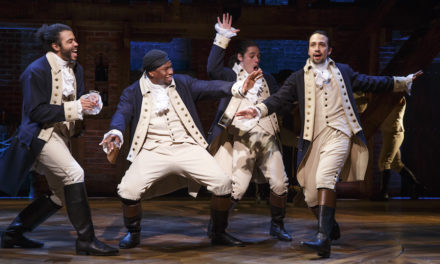Disney may not be releasing another subpar “Star Wars” movie this holiday season, but the producers at Universal Studios seem more than happy to fill that void and kick the mediocrity into maximum overdrive. The “Mortal Engines” trailers would have us believe that this movie is an epic story “from the filmmaker of ‘Lord of the Rings’” — though Peter Jackson didn’t actually direct it, he co-wrote the script and held one of five producer credits. In reality, this film is such a dull combination of every possible story beat, trope and one-liner from every adventure movie you have already seen. The film has so little charm, tact and self-awareness that it resulted in a barely passable assemblage of pieces of different movies, rather than a loving greatest-hits story that recaptures the joy and wonder of epics like “Lord of the Rings.”
Despite the intriguing charm of the movie’s premise — a dystopian future where survivors roaming a wasteland of Earth’s surface resort to living in giant, monster-truck mobile cities — the story of “Mortal Engines” fails to capitalize on the factors of its world that could make the film exciting. The structure of the plot shares a lot with that of “A New Hope” and does little more than put a thin, dystopian, steampunk coat of paint on the story to make it feel any different. One of the two leads is quirky Tom Natsworthy (Robert Sheehan), a young historian living in London. After witnessing the other lead, Hester Shaw (Hera Hilmar), attempt to kill one of London’s leaders, Thaddeus Valentine (Hugo Weaving), to avenge her mother’s death, Tom and Hester are thrown off London and forced to traverse the wasteland together. As they travel, they are kidnapped, chased by an assassin and meet a group of rebels out to stop Thaddeus and other mobile-cities from destroying their peaceful, non-mobile country. Meanwhile, Thaddeus endeavors to build a super-weapon to blow up the rebels’ wall so London can roll-through their nation.
From cardboard cutout characters and recycled plot elements filling an overstuffed story to copy-paste dialogue and tired visual elements, the movie does little to distinguish itself. Even when the film tries to set out on its own path, it seems to forget what it wanted to do moments later. Hester even says to Tom that she’s “not going to tell you [her] sad story,” only to spend the next two conversations delving into some of the most predictable backstory imaginable. She loses all personality after her first scene, and she and Tom spend the rest of the film mindlessly going where other people tell them to. And the filmmakers have, for some reason, thrown in some cringey, unoriginal humor to spice things up (be warned: there’s a “Minions” joke in the first 15 minutes).
To the film’s credit, it starts strong, with a chase between a tiny town on wheels driving away from the hulking London mobile, with an action sequence on the interior of the massive vehicle. These scenes display, at the very least, the kind of fun we would expect from Jackson, yet the movie sputters to a halt as it leaves the giant machines behind and relies on its paper-thin characters to carry the film. The film’s fundamental issue is that, as much as it wants to be like every other adventure film, it does not contain the same aspects that made those movies good. Films in this genre can approach their stories from many ways, but typically the ones that have stood out as classics (and the ones that this movie seems to draw from) are founded on strong characters, ranging from complex to simply memorable and charismatic. These characters pursue epic goals because of their sympathetic or compelling values or motivations, in a world that is just as thrilling for the audience to explore as it is for the characters. While this movie clearly tries to hit some of those marks, hardly anything it does creates a strong connection between the audience and the characters, the world or the events of the story itself. “Mortal Engines”, in premise, seems like a promise of “Howl’s Moving Castle” meets “Mad Max,” yet it can neither commit to the well-crafted characters and wonder of the former or the creative, high-intensity action of the latter. To build a great action-adventure movie, especially one so obviously modeled after those that came before it, you have to figure out what works to engage your audience, and not just expect them to care just because something is happening on screen. “Lord of the Rings” viewers don’t want Frodo to destroy the ring because they’re worried for the safety of Middle-earth; they want to see the ring destroyed because, if it isn’t, then all they characters the audience have come to love are going to be essentially doomed.
I would really like to say that the film, while not a good story, still manages to be fun at points. But I can’t. The filmmakers have little dedication to their giant city/monster-trucks concept, so they hardly extend the fun of that much further than the opening scene. Any fight scenes that are forced into the script to break up the moments of uninspired backstory are almost always choppy, predictable and lack any legitimate tension or suspense. And the supporting cast that shows up halfway through the film adds little to the dynamic other than to tell the protagonists where to go and to act as cannon fodder in the fights to give the illusion that the film has any stakes. With hardly any entertaining action, no meaningful character development (just a “romance” between two characters with absolutely no chemistry) and a lazy handling of a potentially interesting concept, this movie is not worth the price of admission.
“Mortal Engines” seems like it would fare better as a video game than a movie. A theoretically vast world to explore for hours and a cast of bland characters for audiences to project themselves onto sounds much like an enjoyable multiplayer online game. It honestly feels insulting both to moviegoers and to the “Lord of the Rings” franchise that this movie uses Jackson’s involvement in the project to mislead people into expecting anything close to the Oscar-winning trilogy.
Grade: D
Rhett Hipp (22C) is from Winter Park, Florida, majoring in film and media studies, creative writing and Japanese language and culture. Along with writing for the Wheel, Hipp is the current vice president of Emory’s Japanese Cultural Club. He reviews films, games and anime. Contact Hipp at rhett.hipp@emory.edu.





